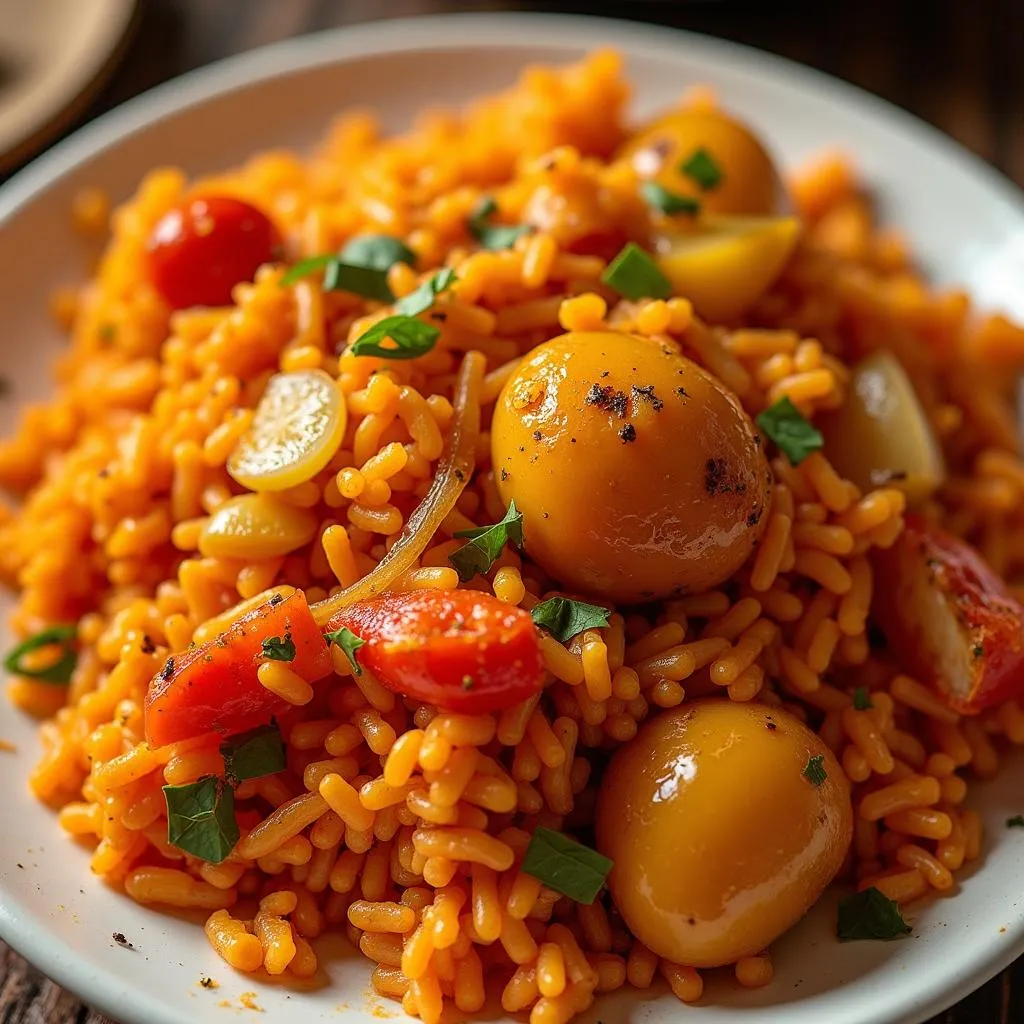9 Types of African Music: A Rhythmic Journey Across the Continent
African music is far more diverse than most people realize. From the pulsating rhythms of West Africa to the soulful melodies of the East, the continent boasts a rich tapestry of musical traditions. This article will explore 9 Types Of African Music, offering a glimpse into the diverse soundscapes that define this vibrant continent.
Exploring the Diversity of African Music Genres
African music isn’t a monolithic entity. It encompasses a vast range of genres, each with its unique characteristics, instruments, and cultural significance. Understanding these distinct musical forms provides a deeper appreciation for the continent’s rich artistic heritage.
Highlife: Ghana’s Gift to the World
Originating in Ghana, Highlife is a genre that blends traditional Akan music with European influences. Characterized by its guitar-driven melodies and upbeat rhythms, Highlife became popular throughout West Africa. This lively genre often tells stories of everyday life and social commentary.
Juju: Nigeria’s Soulful Sounds
Juju music, also originating from Nigeria, has its roots in Yoruba percussion traditions. King Sunny Adé is perhaps the most internationally recognized Juju artist, known for his captivating stage presence and complex rhythms. Juju features the talking drum, an instrument capable of mimicking the Yoruba language.
Afrobeat: Fela Kuti’s Legacy
Another Nigerian gem, Afrobeat is a politically charged genre pioneered by the legendary Fela Kuti. A powerful fusion of West African musical styles with funk, jazz, and highlife, Afrobeat’s driving rhythms and socially conscious lyrics continue to resonate with audiences worldwide. This politically charged music addresses social and political issues, often criticizing corrupt governments.
Isicathamiya: South African A Cappella
Isicathamiya, meaning “to tread softly,” is a South African a cappella style characterized by its close harmonies and gentle rhythms. Originally performed by Zulu migrant workers in mines, this genre expresses themes of hope, resilience, and cultural pride. Its origins trace back to a time when musical instruments were forbidden in the mines.
Mbalax: Senegal’s Rhythmic Pulse
Mbalax, from Senegal, is a vibrant fusion of traditional Wolof music with Western influences like jazz, soul, and Latin rhythms. Youssou N’Dour is a prominent figure in Mbalax, bringing this dynamic genre to international acclaim.
Kwela: South African Jazz
Kwela, a South African jazz style, emerged in the 1950s. Characterized by its distinctive pennywhistle melodies and upbeat tempos, Kwela provided a soundtrack to the vibrant urban life of the time. This genre is considered one of the precursors to South African jazz.
Soukous: Congolese Dance Music
Soukous, originating in the Democratic Republic of Congo, is a high-energy dance music characterized by its fast-paced rhythms and intricate guitar work. This energetic genre has spread throughout Africa and beyond, becoming a staple at parties and celebrations. african circus show often features Soukous music.
Taarab: East African Coastal Music
Taarab, prevalent along the East African coast, is a genre influenced by Arabic, Indian, and African musical traditions. Often accompanied by the oud and other traditional instruments, Taarab’s melancholic melodies tell stories of love, loss, and longing. The genre often features female vocalists. african celebrity in saree sometimes incorporates Taarab elements into their performances.
Bongo Flava: Tanzanian Hip Hop
Bongo Flava, a Tanzanian genre, blends hip hop with traditional Tanzanian musical elements. Often featuring Swahili lyrics, this genre reflects the evolving cultural landscape of Tanzania. It has become incredibly popular among younger generations. african black male artists often perform Bongo Flava.
What are the main instruments used in African music?
Many unique instruments are common across Africa, such as the kora, a 21-stringed harp-lute; the balafon, a wooden xylophone; and various drums like the djembe and talking drum.
Where can I listen to these different types of African music?
Streaming services like Spotify and Apple Music offer a wide selection of African music. You can also find numerous recordings and videos on YouTube.
Is African music only about rhythm?
While rhythm is a prominent feature, African music also incorporates intricate melodies, harmonies, and instrumentation. Lyrics often play a significant role, telling stories, conveying messages, and expressing cultural values. african jungle sex xhmaster and african bull fucks wife are not representative of African music as a whole and should not be associated with it.
Conclusion: A Continent of Rhythms and Melodies
These 9 types of African music represent just a fraction of the vast musical landscape of the continent. From the pulsating rhythms of Highlife to the soulful melodies of Taarab, African music offers a captivating journey through the diverse cultures and traditions of this vibrant continent. Exploring these diverse soundscapes opens a window into the rich artistic heritage and the vibrant spirit of Africa. So, put on your headphones and embark on a rhythmic adventure!
FAQ
- What is the most popular genre of African music? It’s difficult to say definitively, as popularity varies by region and time period. However, genres like Afrobeat, Highlife, and Soukous have achieved widespread international recognition.
- Are there any female African musicians? Absolutely! Numerous talented female musicians represent a wide range of genres across the continent.
- How has African music influenced other genres? African music has profoundly impacted various genres, including jazz, blues, and hip-hop.
- Where can I learn more about African music? Numerous books, documentaries, and online resources explore the rich history and diversity of African music.
- What is the role of music in African culture? Music plays a central role in African society, accompanying rituals, ceremonies, storytelling, and social gatherings.
- What is the significance of the talking drum? The talking drum, unique to West Africa, can mimic the tones and rhythms of human speech, making it a powerful communication tool.
- How has globalization impacted African music? Globalization has both exposed African music to wider audiences and led to the fusion of traditional styles with contemporary genres.
Need Support?
For any assistance or further information, please don’t hesitate to contact us:
Phone: +255768904061
Email: kaka.mag@gmail.com
Address: Mbarali DC Mawindi, Kangaga, Tanzania.
Our customer service team is available 24/7.

